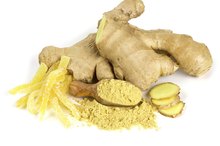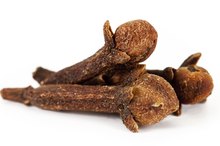If you have a congested cough, also known as a wet cough, seek relief in natural expectorants. These substances thin out and break up the mucus stuck in your lungs, making it easier to breathe and your cough more productive. Remember to spit out any mucus that's dislodged, rather than swallowing it. Also, using natural expectorants can provide symptomatic relief, but be sure to consult a doctor about treating the underlying cause of your cough. In the meantime, drink lots of fluids--staying hydrated helps thin the mucus in your lungs.
If you are experiencing serious medical symptoms, seek emergency treatment immediately.
Licorice
Licorice is not only a natural expectorant, it soothes irritated throats and inflamed lungs and it acts as a cough suppressant as well. Drink a tea made with 1/2 tsp. licorice root three times a day, or use purchased lozenges as directed. Do not take licorice if you have high blood pressure.
- Licorice is not only a natural expectorant, it soothes irritated throats and inflamed lungs and it acts as a cough suppressant as well.
- licorice root three times a day, or use purchased lozenges as directed.
Sage Tea
Foods That Act As an Expectorant
Learn More
Sage is another natural herbal expectorant and is easy to take in the form of sage tea. Use 2 tsp. of fresh leaves or 1 tsp. of dried sage per cup of hot water. Drink two to three times daily; sweeten with honey if desired. The book Smart Medicine For Healthier Living suggests combining sage with thyme as a tea; thyme is another excellent expectorant. Pregnant and nursing women should avoid large medicinal doses of sage. Culinary use is permitted.
- Sage is another natural herbal expectorant and is easy to take in the form of sage tea.
- Drink two to three times daily; sweeten with honey if desired.
Horehound
Many herbalists recommend horehound as an effective natural expectorant. It also acts as a relaxant and cough suppressant, soothing irritated lungs. It is believed that marrubin, one of the compounds found in horehound, helps stimulate bronchial secretions. Horehound is very bitter, so sweetened lozenges are the usual remedy recommended; tablets are also available.
- Many herbalists recommend horehound as an effective natural expectorant.
- Horehound is very bitter, so sweetened lozenges are the usual remedy recommended; tablets are also available.
Eucalyptus
How to Stop a Wheezing Cough
Learn More
Eucaplytus acts as both a decongestant and an expectorant. Most people are familiar with it in lozenge form, but in the case of a persistent cough, it is perhaps more effective as a steam or chest rub. Health 911 suggests using 10 to 15 drops of eucalyptus oil plus three drops of hyssop oil, another strong expectorant, in a pot of boiling water; inhale the steam that results 1.
Cayenne
Cayenne thins and loosens mucus, making it easier to expel from the lungs. It also stimulates the body, including the chest. Home remedies include eating hot peppers and adding a dash of red pepper to medicinal teas. You can also take it in capsule form.
- Cayenne thins and loosens mucus, making it easier to expel from the lungs.
Garlic
Garlic has earned its reputation as an herbal cure-all. As an expectorant, it can be used as a steam inhalant, a chest rub or taken internally. Eat a raw garlic clove one to three times daily. Alternatively, you can prepare a garlic-based cough syrup. The easiest method is simply to grate a clove of garlic into a teaspoon of honey and eat.
- Garlic has earned its reputation as an herbal cure-all.
- Alternatively, you can prepare a garlic-based cough syrup.
Related Articles
References
- Health 911: Coughs
- Herbal Ed: What's In A Cough?
- Herbal Encyclopedia: Licorice
- "Smart Medicine For Healthier Living;" Janet Zand, Allan N. Spreen, James B. LaValle; 1999
Writer Bio
Lori A. Selke has been a professional writer and editor for more than 15 years, touching on topics ranging from LGBT issues to sexuality and sexual health, parenting, alternative health, travel, and food and cooking. Her work has appeared in Curve Magazine, Girlfriends, Libido, The Children's Advocate, Decider.com, The SF Weekly, EthicalFoods.com and GoMag.com.









